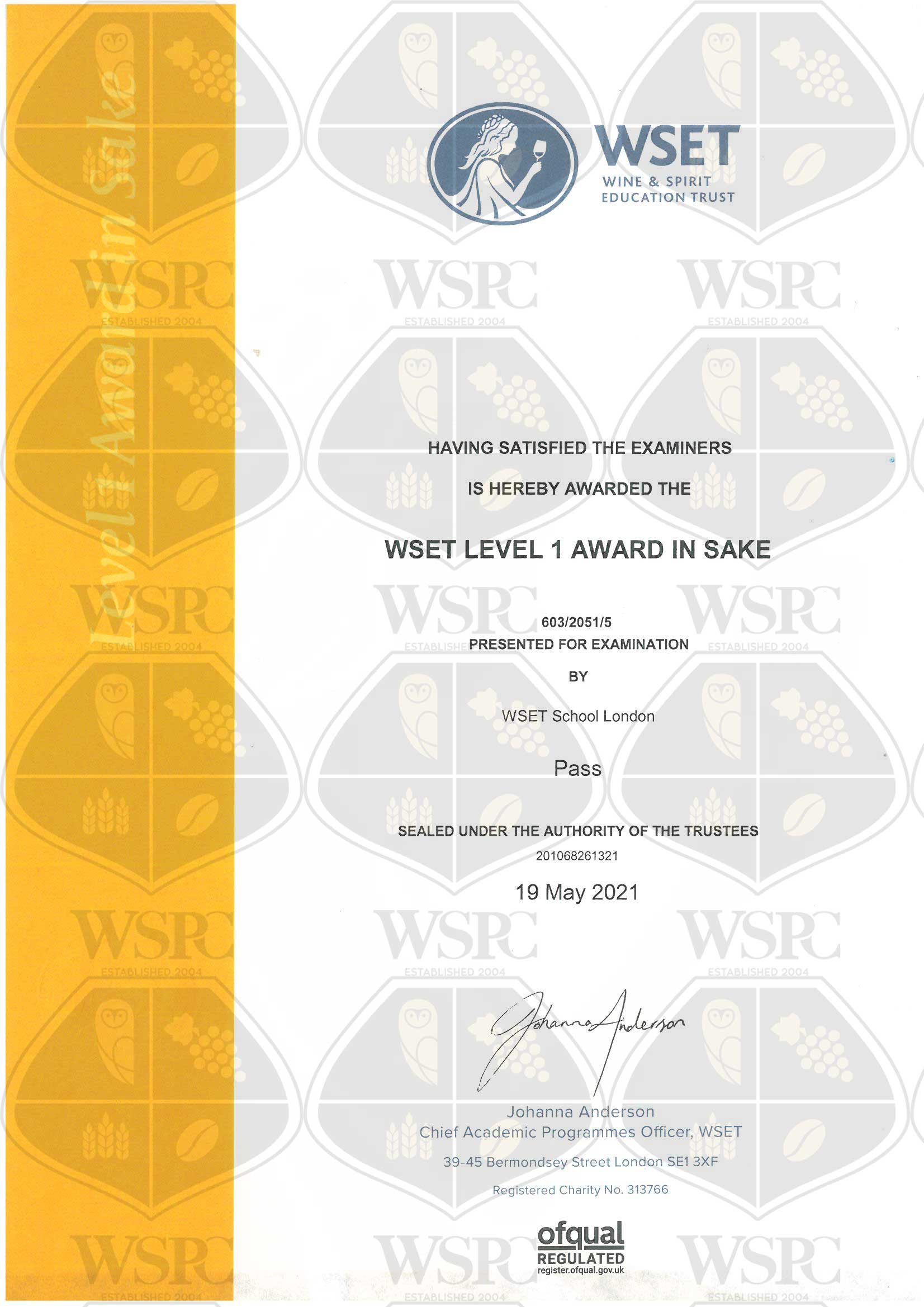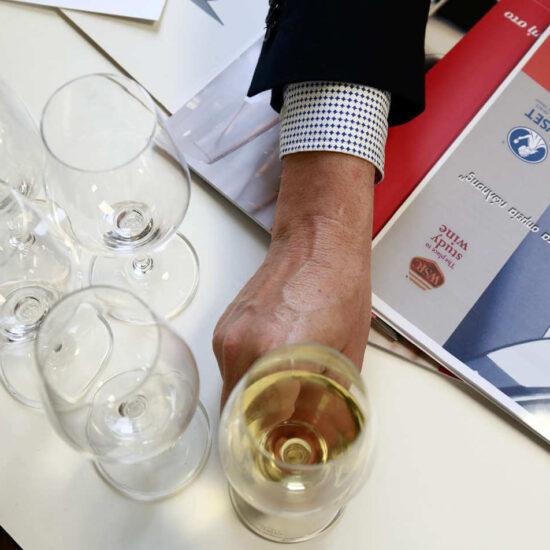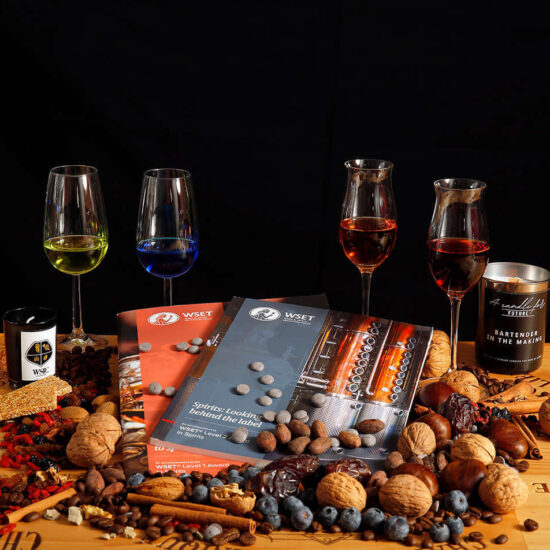WSET Level 1 in Sake
€345
About this course

or Installments
The selection of installments reshapes the final value of the fees and the number of installments is applied at the completion of your order, during Checkout.
The WSET Level 1 Certification in Sake is addressed to those who want to pursue a career in the broader industry or have an interest in sake. It is designed to provide a reliable yet simple introduction to sake.
About the course
The WSET Level 1 Certification in Sake offers a practical introduction to the world of sake.
Holders of the Level 1 Certification in Sake will be able to distinguish the main styles and types of sake, define their representative characteristics and know the basic principles of storing and serving sake. Passing the exams is a necessary condition for the award of the Certification. Successful performance in the examinations is a prerequisite for being awarded the Certification.
MORE
The Level 1 Certification in Sake will help those who need familiarity with the main styles and categories of sake, for example Front Line Staff managing a wider portfolio of alcoholic beverages in the retail, wholesale and catering sectors.
The key principles of tasting governing both spirits and wines help students in further advancing their studies in sake.
In total, this training program consists of 6 hours of lessons and exams.
This program is taught in Greek. The teaching material and the program’s examinations shall be exclusively carried out in English.
Results are announced in 6-8 working weeks from the examination date. Passing the exam is a prerequisite for continuing your studies in Level 3 in Sake.
Program of Courses andCurriculum
Level 1 in in Sake
Learning Outcomes
In order to meet the qualification aims there are three learning outcomes.
Learning Outcome 1: List and state the purpose of the main ingredients and the main production steps used to make sake
- List and state the purpose of the main ingredients that are legally permitted in sake production.
- List and state the purpose of the main production steps used to make sake.
| Range 1: Main sake ingredients | |
|---|---|
| Ingredients | Steamed white rice, kōji, yeast, water, high strength distilled alcohol (optional) |
| Range 2: Main production steps | |
|---|---|
| Rice preparation | Polishing (impact on style), washing, soaking, steaming |
| Kōji production | Cooling rice, spreading the mould, initial mould growth, controlling and stopping the mould growth |
| Fermentation | Fermentation starter, main fermentation Warm fermentation, cool fermentation (impact on style) |
| Filtration and bottling | Addition of high strength distilled alcohol (optional), filtration, dilution with water (optional), bottling, pasteurisation (optional) |
| Range 3: Production processes that affect flavour, sweetness and colour | |
|---|---|
| Flavour | Raw material, fermentation, distillation strength, unaged, oak ageing (new and old oak), blending (consistency and complexity), redistillation, maceration, adding natural/artificial flavourings, dilution with pure water |
| Sweetness | Added sugar |
| Colour | Oak, caramel, other natural and artificial colours |
Learning Outcome 2: Name the principal categories and grades of sake as well as some speciality styles of sake and state their key characteristics
- Name the principal categories and grades of sakes and state their key characteristics.
- Name some of the speciality styles of sake and state their key characteristics.
- State the production steps that are legally controlled for the principal and some speciality categories of sake.
- Recognise Japanese labelling terms for some of the principal categories of sake.
| Range 1: Principal categories and grades of sake | |
|---|---|
| Principal categories of sake | Futsū-shu (basic), premium |
| Grades of premium sake | Honjōzō, ginjō, daiginjō Junmai, junmai ginjō, junmai daiginjō |
| Range 2: Speciality styles of sake | |
|---|---|
| Speciality styles of sake | Nigori, sparkling sake, koshu, Nama |
| Range 3: Controlled production steps | |
|---|---|
| No addition of high strength distilled alcohol | Junmai |
| Rice polishing ratios | Junmai 100% or less (rice used to make junmai is typically polished to 70% or less) Honjōzō 70% or less Ginjō, junmai ginjō 60% or less Daiginjō, junmai daiginjō 50% or less |
| No pasteurisation | Nama |
| Maturation | Koshu |
| Range 4: Japanese labelling terms | |
|---|---|
| Junmai | 純 米 |
| Honjōzō | 本 醸 造 |
| Ginjō | 吟 醸 |
| Daiginjō | 大 吟 醸 |
Learning Outcome 3: Know and recognise the processes and principles involved in the storage and service of sake.
- State the correct procedures for the storage and service of sake.
- State the common faults found in sake.
- State the key considerations when making a food and sake pairing recommendation.
| Range 1: Storage and service | |
|---|---|
| Storage | Keep it cool, drink it young, store bottle upright, avoid bright lights |
| Service | Serving temperatures (chilled, room temperature, warm/hot), warming sake (waterbath, microwave), service vessels (wine glasses, o-choko, tokkuri, masu) |
| Range 2: Common faults | |
|---|---|
| Faults | Oxidation, out of condition, nama-hine |
| Range 3: Principles of food and sake pairing | |
|---|---|
| Key considerations | Personal preference, flavour intensity, sweetness |
Enrollment
- Express your interest by phone (210 9882540 & 544) or via e-mail(education@wspc.gr)
Your enrollment is finalized with the pre-payment of the tuition fees, either through eshop, or through a bank account deposit/ web-banking.
- After the deposit of tuition fees, a Registration Form is sent to you that you should fill in. Upon correct submission of the Registration Form, your registration is automatically completed.
- Candidate students allowed to participate in the courses should be over the age of 18.
- Candidate students must have an e-mail address to enroll. Any important information regarding your studies is sent by e-mail.
- WSET Level 1 Award in Sake to students successfully completing the course:
On receiving the certificates from WSET London, WSPC sends the WSET Level 1 Award in Sake qualification to successful students by courier together with the lapel pin. The cost for dispatching the certificates shall be borne by the recipient to make sure that this official document will reach the beneficiary on own responsibility.
WSPC shall assume no responsibility in case of negligence in receiving the certificate on behalf of the beneficiary. In case of certificate loss, re-issuing by the WSET® Awards costs €50.00.
- Enrollment corresponds to the course selected by the student. Fees shall not be refundable and shall not be used for enrollment on a next similar course.
- Upon lapse of the registration deadline, there will be no late registration. In the event of a late registration, students shall be encumbered with an additional charge amounting to €50 + V.A.T.
- WSPC shall reserve the right to cancel a course, if the required minimum number of students is not reached. In such a case, the enrolled students shall be credited the entire deposited amount.
Modes of payment:
By Bank deposit to:
- Alpha Bank IBAN: GR33 0140 1180 1180 0233 0000 482 (WSPC L.T.D).
- Piraeus Bank IBAN: GR73 0171 7270 0067 2711 3141 025 (private higher education school).
- Eurobank IBAN: GR06 0260 0190 0005 4020 1143 015 (private higher education school, Vocational Center).
When depositing the fees, candidates are required to complete their full name & details. In the case of the deposits made by Firms, the full company name & address must be shown.
Approved: Visa, Mastercard, Maestro
Basic principles
The purpose of this information is to help our students understand basic principles of behavior that need to be respected throughout the classes.
A class should provide a friendly and harmonious environment, able to promote a high level of learning progress, ensuring a smooth running of the course and respect towards all parties involved in the learning process-both students and instructor.
Don’t miss a class
It has been proven that students who do not miss classes and are assiduous in attending the course, have more chances to perform better in the examination and pass the test with a higher mark. It is students’ personal responsibility to fill in the gap and look out for notes, exercises, homework or/and flights of wines relevant to the class.
Don’t be late for the class
It is a sign of respect vis-à-vis your fellow students and your instructor. Should it happen due to special circumstances, students should enter the classroom as discreetly and quickly as possible, picking the first available classroom desk.
Come prepared to the class
Preparation constitutes an important part of your effort to better comprehend the teaching material and have fewer questions. Students who submit their papers within the deadlines set, manage to maintain a better flow in their studies and to better assimilate the material, significantly raising the chances of successful performance at the exams and with a higher mark. Any assigned tasks submitted overdue shall be dismissed. However, students may correct themselves at home, having as a guide the recommended form of answering applying in every task.
Switch off your mobile phone at the beginning of the class
It is a sign of respect vis-à-vis your fellow students and your instructor. The use of mobile phones in the classroom is highly annoying and distracts students’ attention. If you are expecting an urgent call, you are kindly requested to inform your instructor at the beginning of the class and keep your phone on silent mode. Once you see the incoming call, leave the classroom as discreetly as possible.
Be aware that any portable electronic apparatus (mobile phone, laptop, MP3 player etc) shall not be allowed during the class. For your reference, you may take a photo of the bottles used in wine tasting during the break or at the end of the class (the bottles remain in a visible spot).
Don’t talk to each other during the class
It is a sign of respect vis-à-vis your fellow students and your instructor. The noise provoked from chatting is likely to distract the instructor and other fellow students, thus disrupting the smooth flow of the class.
Don’t monopolize the floor by raising too many questions preventing your fellow students from submitting their queries
Questions facilitate a broad understanding of the lesson. The time allocated for questions is up to the instructor’s discretion (either during or at the end of the lesson). However, students should take into account the available time for questions, reducing the number of questions addressed to the instructor and enabling their fellow students to raise their own questions.
THE ABOVE PRINCIPLES APPLY ALSO DURING THE EXAMINATIONS
Important Information on the examinations
The examination for the WSET Level 1 Certification in Sake is a closed-book assessment comprised of:
- 30 multiple-choice questions to be completed in 45 minutes.
Successful performance at this unit requires a minimum mark of 70%. Candidates should answer correctly at least 21 questions.
- The language of examination will be English.
WSET® Awards does not award Titles of Studies/Certificates unless all prerequisites and assessment requirements regarding the studies and the examinations for each Program of studies are fulfilled (aegrotat pass).
Persons with Disabilities
Candidates with special examination and assessment requirements, are requested to inform the Enrollments officer and/or the Examinations officer on any such requirement prior to enrollment on a Program. It is the policy of WSET Awards that such candidates should not be placed at a disadvantaged position during the courses or at the examinations. Where appropriate, WSPC and WSET may request from the student to submit an official medical opinion by a qualified state body related to the candidate in question.
Re-sit
Candidates may apply to resit the examination if they failed the examinations. There is no limit on the number of attempts to resit the examinations. Candidates who have passed the examinations are not allowed to resit to improve their grade.
- Examinations are compulsory. If a candidate does not sit the examination on the fixed date and time, it will be possible, to request and sit the next possible examination for Level 1 on a re-sit cost (re-sit exam fee): €110.
- If a candidate fails the examination, it will be possible, to request and re-sit the next possible examination for Level 1 on a re-sit cost (re–sit exam fee): €110.
- Enrollment in WSET Level 3 Award in Sake requires successful performance at WSET Level 1 Award in Sake.
Requirements, regulations and examination conditions
1. To participate in the examinations, candidates must adhere to the following specific conditions:
- At the start of the examination, all candidates must submit to the invigilator a statutory identification document with a photograph (identity card or a driving license or a passport).
- Candidates should bring their own: Hb2-type pencils, erasers, pencil sharpener.
- Candidates must bring their own bottle of water.
- The examination should be completed within the time foreseen.
- No note or explanation is to be made on any material, in whatever form, other than the examination multiple-question paper and answer sheet.
- Any communication between candidates of any kind shall not be permitted.
- The use of electronic devices of any kind (mobile phones, smart phones, smart watches, tablets etc) shall be prohibited.
- Candidates shall be forbidden to take photographs of the examination room or the examination material.
- The use of any kind of dictionaries is forbidden.
- The use of audible alarms from any kind of watch is prohibited.
- It is at the invigilator’s discretion to allow entry to late arriving candidates and only if this does not disturb the examination process.
- Candidates are not allowed to leave the room before the first 15 minutes of the examination time have elapsed.
- Candidates who complete the examination prior to its official ending, may leave the room on condition that they do not disturb the other candidates. After leaving the room, re-entry shall not be allowed.
- The invigilators have no authority to comment, interpret or express an opinion on any examination question or/and on any conceptual question raised by candidates.
- Any candidate suspected of inappropriate behavior, shall be called upon to leave the examination room immediately and his/her examination paper shall be submitted to the Examinations Committee which shall determine its validity and any future prohibition to participating in the examinations.
- The sheet with the examination questions shall not be removed from the examination room. Candidates who fail to submit the questions sheet along with their answer sheet, shall be considered to have breached the rules.
- It is forbidden to reveal the examination content to others or anyhow reproduce it.
2. Candidates must also comply with the invigilator’s instructions. Failure to do so may result in the examination results becoming invalid.
3. The examination papers submitted for assessment belong to WSET® Awards and shall not be returned to candidates.
WSET Level 1 Award in Sake to students successfully completing the course
On receiving the certificates from WSET London, WSPC sends the WSET Level 1 Award in Sake qualification to successful students by courier together with the label pin. The cost for dispatching the certificates shall be borne by the recipient to make sure that this official document will reach the beneficiary on own responsibility.
WSPC shall assume no responsibility in case of negligence in receiving the certificate on behalf of the beneficiary. In case of certificate loss, re-issuing by the WSET® Awards costs €50.00.
Examination Enquiries, Feedback and Appeals
- Candidates requesting a re-mark and/or feedback on their examination sheet shall have to contact WSPC and fill in an Enquiry & Feedback Form. The form should be filled in and be delivered to WSPC along with the corresponding monetary amount within the rigorous time frame set by your Program provider from the examination date. Any request received beyond the time frame set shall be dismissed. Re-mark and feedback will be provided by WSET Awards within two weeks following receipt of the request.
- Any candidate remaining dissatisfied with the request outcome in relation to the examination sheet should contact WSPC and file an Appeal against Enquiry Application Form; this appeal should be completed and sent to the WSET Awards with the appropriate fee within 10 working days following the communication of the request. Any request received beyond the time frame set shall be dismissed. Answers to the Appeals shall be issued within two weeks upon receipt by the WSET Awards.
Where do classes take place?
At our state-of-the-art facilities in Paleo Faliro. In a facility of 1,200 sq.m of surface, in line with the strictest health and safety specifications.
Virtual Tour
How can I better prepare myself for the class?
The following file will help you better understand the requirements for the Programs you attend, better plan your study and achieve the optimum result at the examinations. Read it!
Is there a V.A.T rate applied on the tuition fees?
No, because WSPC is an educational organization certified by the Ministry of Education.
What do tuition fees include?
Everything.The fees cover the English edition of the Program’s books, the enrollment on WSET London, the examination cost, the exam paper and the issuing of the Title of Studies from WSET London, the teaching hours by a certified instructor, the tasting spirits bought (free samples are not accepted), as well as any organizational logistics cost for the entire Program.
May I be absent from the class?
Missing a class in Level 1 in Sake shall not be allowed.
Your presence is compulsory in the class and at the examinations.
May I sit the examinations in Greek?
No. Although this course is taught in Greek, the teaching material and the Program’s examinations shall be exclusively carried out in English.
What happens if I do not show up at the examinations?
You may enroll to participate in the next scheduled examination of the Program, either in the same city or in another city where exams will be held, paying the (re–sit exam fee) standing at €110.
What happens if I fail the examinations?
You may enroll to participate in the next scheduled examination of the Program, either in the same city or in another city where exams will be held, paying the (re–sit exam fee) standing at €110.
How long does it take for the results to be announced?
It takes six-eight (6-8) working weeks since the examination date.
How do I get informed about the results?
By e – mail from the WSPC Admissions & Awards team.
What does it mean to succeed in examinations?
You become holder of the internationally renown WSET Level 1 Award in Sake Qualification awarded by the WSET (Wine & Spirit Education Trust), headquartered in the United Kingdom (London), and you may advance to the next level of studies WSET Level 3 Award in Sake.
How do I receive my certification?
On receiving the certificate from WSET London, WSPC sends your Certification by courier for WSET Level 1 Award in Sake together with the lapel pin corresponding to the completed educational Program. The cost for dispatching the certificates shall be borne by the recipient to make sure that this official document will reach you, as the beneficiary on own responsibility.
May I pay the fees in installments?
Yes. Through the eshop, you may pay in installments with your credit card.
Is there a possibility for corporate enrollments?
Yes, it is possible. Contact us to fill you in.
What are the foreseen options in case live classes are discontinued due to force majeur, as was the case with the pandemic COVID-19?
Should an unforeseen situation occur, classes continue through an online platform. Online classes constitute an accurate extension and continuation of your studies, fully aligned with the requirements as set by the circumstances and the Ministry of Education & Religious Affairs.
You May Also Like
Certificate































